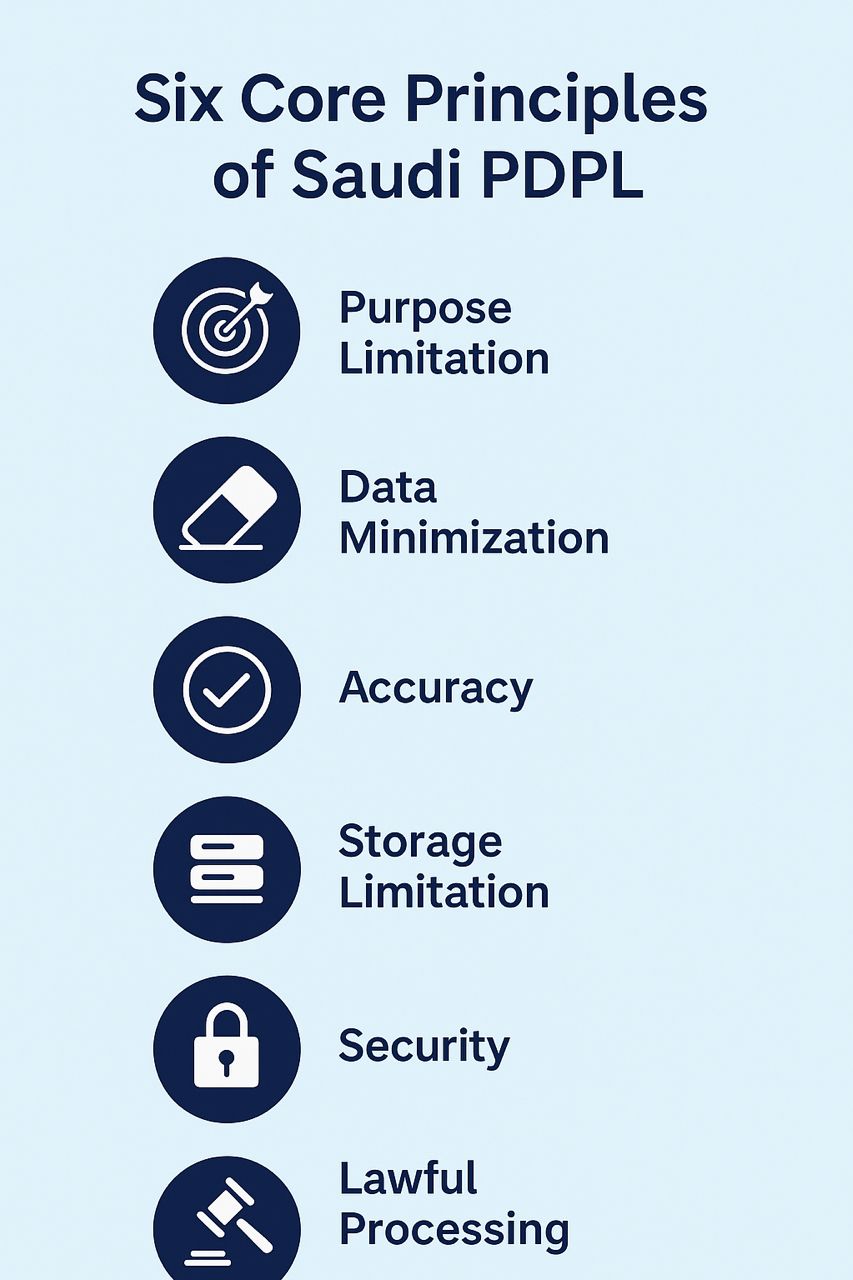Complying with Saudi Arabia’s Personal Data Protection Law – SDAIA PDPL

Saudi Arabia made a significant commitment to data privacy when the Personal Data Protection Law (PDPL) became fully enforceable on September 14, 2024. After a one-year grace period, this comprehensive legislation now governs the handling of personal data across the Kingdom.
Whether you’re an individual curious about your rights, a small business owner, or part of a large organization, the PDPL affects how personal information is collected, processed, and protected in Saudi Arabia. This isn’t just another law tucked away in legal documents; it has real implications for everyone who handles or shares personal data.
What Is Personal Data Under PDPL?
The PDPL represents Saudi Arabia’s first comprehensive federal data protection law, issued under Royal Decree No. M/19 of 2021 and later amended by Royal Decree No. M/148 of 2023. What sets this framework apart is its careful balance between protecting individual privacy rights and supporting the Kingdom’s ambitious Vision 2030 goals.
The law became fully enforceable on September 14, 2024, after a one-year transition period that allowed businesses to adjust their operations and achieve compliance. This strategic approach gave organizations time to implement necessary changes while ensuring the law’s effectiveness upon enforcement.
The Personal Data Protection Law (PDPL) aims to protect individuals’ personal data privacy and regulate organizations’ collection, processing, disclosure, or retention of personal data. The Saudi Data & AI Authority (SDAIA) serves as the regulatory body overseeing compliance, providing a centralized approach to data protection oversight.
What makes this particularly important is that the law applies to anyone processing personal data in Saudi Arabia, regardless of where the processing actually takes place. This extraterritorial reach means that even organizations based outside the Kingdom must comply if they’re handling Saudi residents’ data.
Six Core Principles That Shape Data Protection

The PDPL is built around six fundamental principles that govern how personal data must be handled:
Purpose Limitation: Personal data can only be collected for specific, legitimate purposes that are clearly defined. The purpose of collecting personal data must be directly related to the purposes of the owner, direct, clear, secure, and free from methods of deception, misleading, or extortion. You can’t collect information without a clear reason or keep it for unrelated uses later.
Data Minimization: Only collect what you actually need. If you’re collecting contact information for a newsletter, you don’t need someone’s employment history or medical details.
Accuracy: The information you hold must be accurate and kept current. This creates ongoing obligations to verify data and provide ways for people to correct mistakes.
Storage Limitation: Personal data cannot be kept indefinitely. Once the original purpose for collection is fulfilled, the data must be deleted or anonymized according to specific retention schedules.
Security: Appropriate technical and organizational measures must protect personal data from unauthorized access, alteration, or destruction.
Lawful Processing: Every use of personal data must have a legal basis, whether that’s consent, contract fulfillment, legal obligation, or legitimate interest.
Your Rights Under the PDPL
The PDPL framework grants individuals substantial control over their personal data. These rights include:
The Right to Be Informed ensures people know why their data is being collected, who’s collecting it, and how it will be used. This goes beyond simple privacy notices to meaningful transparency.
The Right to Access allows individuals to request copies of their personal data. Organizations must provide this information in a clear, accessible format.
The Right to Rectification enables people to correct inaccurate or incomplete data. This is particularly important for financial services and healthcare organizations where data accuracy is critical.
The Right to Erasure permits individuals to request deletion of their data when it’s no longer needed, though certain legal exceptions apply.
The Right to Data Portability allows people to receive their data in a machine-readable format and transfer it to another service provider.
The Right to Withdraw Consent ensures individuals can change their minds about data processing, except where legal obligations require continued processing.
Cross-Border Data Transfers
One of the most challenging aspects of the PDPL involves moving personal data outside Saudi Arabia. The law requires adequate protection measures before any international transfer can occur.
Anyone who violates the provisions of cross-border data transfer is subject to maximum imprisonment of one year and a fine not exceeding SAR 1 million (USD 267K), or one of these two penalties. This makes international data sharing a carefully regulated process.
The law provides several pathways for lawful transfers, including adequacy decisions where SDAIA determines another country has sufficient protection, standard contractual clauses, and binding corporate rules for multinational organizations.
For many organizations, this means reviewing all international data flows and ensuring proper safeguards are in place. Cloud storage, international email systems, and global customer databases all fall under these requirements.
The Consequences of Non-Compliance
The PDPL’s enforcement mechanisms are designed to ensure compliance through significant deterrence. The PDPL provides that the penalty for disclosing or publishing sensitive personal data may include imprisonment for up to two years and/or a fine not exceeding SAR 3 million ($800,000); both organizations and individuals can therefore be sanctioned.
Non-compliance with the PDPL may result in fines of up to $1.3 million (which can be doubled for repeat offences), possible imprisonment for certain disclosures of sensitive personal data, warnings, confiscation of funds obtained as a result of the violation, and compensation claims.
These penalties apply to both organizations and individuals within those organizations. This personal liability aspect means that executives, data protection officers, and other key personnel can face individual consequences for compliance failures.
Regional Context and Comparisons
Saudi Arabia’s PDPL is part of a broader regional movement toward comprehensive data protection legislation. The UAE has implemented similar protections through their own framework, and understanding how these laws interact is crucial for anyone operating across the Gulf region.
For those already familiar with the UAE’s Personal Data Protection Law, many principles will be recognizable, though the specific requirements and enforcement mechanisms differ. You can learn more about the UAE’s approach in our comprehensive guide to UAE PDPL compliance.
Making Compliance Manageable
Modern cybersecurity compliance requires modern solutions. Specialized platforms like Complyan can help automate many of the ongoing obligations under the PDPL, from managing data subject requests to monitoring data flows and ensuring proper retention schedules.
The Saudi Data & AI Authority (SDAIA) also provides official guidance and resources for understanding the law’s requirements. Staying connected with these official sources ensures you’re always working with the most current information.
Regular assessments and audits help ensure your compliance measures remain effective as your organization grows and changes.
Conclusion
Saudi Arabia’s PDPL represents a significant milestone in the Kingdom’s digital transformation journey. By establishing comprehensive data protection standards, the law creates a foundation for sustainable economic growth while protecting individual privacy rights.
Successful compliance requires more than technical implementation. It demands cultural change, ongoing investment, and genuine commitment to privacy principles. Organizations that embrace these requirements will not only meet legal obligations but also build competitive advantages through enhanced customer trust.
For organizations seeking to thrive in this new regulatory environment, the key is to view PDPL compliance not as a burden but as an opportunity to build better, more trustworthy business practices that serve both commercial interests and individual rights.





 Governance and Policy Management
Governance and Policy Management